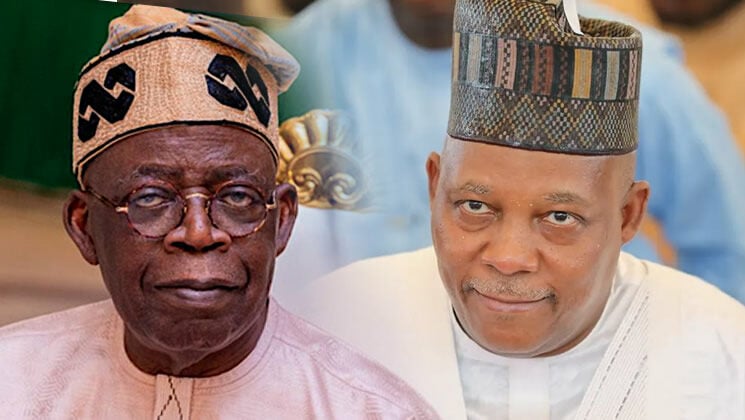Fresh details have emerged on the official earnings of Nigeria’s top political office holders, following data released by the Revenue Mobilisation Allocation and Fiscal Commission (RMAFC) and corroborated by other government sources.
The figures, which cover salaries and allowances for key executive, legislative, and judicial officials, provide insights into the cost of governance in Africa’s largest democracy.
President and Vice President
The President of Nigeria, Senator Bola Tinubu, currently earns a monthly basic salary of N1,405,882. This excludes consolidated allowances of over N7.5 million, bringing his annual salary to N106,870,584.
In addition to the regular salary, the President is entitled to several allowances, including hardship allowance (50% of basic salary), consistency allowance (250% of basic), leave allowance, estacodes, duty tour, security, accommodation, utility, furniture (paid once every four years), staff, and vehicle maintenance.
The Vice President, Senator Kashim Shettima,
receives a slightly lower monthly package of N1,212,629, translating to an annual salary of N14,551,548. His entitlements also include hardship, consistency, utility, domestic staff, vehicle, assistants, newspaper, and security allowances.
Chairman of the RMAFC, Mohammed Bello, said the commission was going ahead to increase the monthly earnings of public office holders, noting that the current earnings, fixed over a decade ago, were no longer in tune with current realities.
“You pay the President of the Federal Republic of Nigeria N1.5 million a month, with a population of over 200 million people. You cannot pay a minister less than N1 million per month since 2008 and expect him to put his best; he won’t be involved in other things,” Shehu said in justification for the planned upward review of the emoluments of government officials.
Curiously, RMAFC refused to provide detailed information about how much the President and the Vice President and their aides are paid on a regular basis.
The Revenue Mobilisation Commission refused to confirm or provide more details about how every public office holder, including the President and lawmakers, earns.
RMAFC’s spokeswoman, Maryam Umar Yusuf, refused to respond to messages and calls for comment on the issue. RMAFC has repeatedly defended the pay structure, noting that the allowances are designed to cover operational costs required by public office holders to perform their constitutional duties effectively.
Senators
The RMAFC chairman disclosed that each serving Senator collects a monthly salary and allowances of N1,063,860, consisting of the following: basic salary – N168,866.70; motor vehicle fueling and maintenance allowance – N126,650; personal assistant – N42,216.66; domestic staff – N126,650; entertainment – N50,660; utilities – N50,660; newspapers/periodicals – N25,330; wardrobe – N42,216.66; house maintenance – N8,443.33; and constituency allowance – N422,166.66.
Some allowances are regular, while others are non-regular. Regular allowances are paid regularly with basic salary, while non-regular allowances are paid as and when due. For instance, furniture allowance (N6,079,200) and severance gratuity (N6,079,200) are paid once in every tenure, and vehicle allowance (N8,105,600), which is optional, is a loan that the beneficiary has to pay before leaving office.
In the House of Representatives, the Speaker earns an annual basic salary of about N2.48 million. At the same time, allowances raise his total package to about N18.33 million annually, according to an official document from RMAFC.
Former Speaker Yakubu Dogara had once disclosed that total allowances for the office could reach as high as N25 million monthly. The Deputy Speaker of the House earns allowances totaling around N17.16 million annually, in addition to the basic pay.
Ordinary members of the National Assembly officially earn less than N1 million monthly in salaries. Senators, for instance, take home a basic salary of about N600,000 after statutory deductions. However, allowances and running costs push the total compensation significantly higher.
Current estimates suggest senators receive about N21 million monthly in allowances, with their annual package averaging N12.77 million or more. Members of State Houses of Assembly earn comparatively lower salaries, though their pay structures are also a combination of basic salaries and allowances as determined by RMAFC.
Governors and Deputies
On paper, state governors earn a basic monthly salary of ₦185,308, amounting to ₦2,223,705 annually. With allowances factored in—including vehicle loans, medical, leave, accommodation, furniture, and travel—the total annual package for governors rises to about ₦11,540,896.
Deputy governors earn about ₦2,112,215 annually in basic salary, but allowances push their total package to about ₦10,772,296.
Judiciary Earnings
The Chief Justice of Nigeria (CJN) is the highest-paid judicial officer, with a monthly salary of ₦1,346,589. Justices of the Supreme Court and the President of the Court of Appeal each earn ₦990,844 monthly, while Justices of the Court of Appeal and Chief Judges of Federal and State High Courts earn ₦798,172.07 monthly.
A Judge of the Federal High Court and a Judge of State/FCT High Courts each receive a basic salary of about ₦776,038.22 monthly, exclusive of various allowances, estacodes, and duty tour entitlements.






